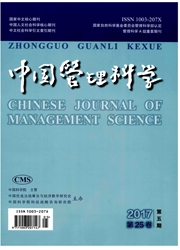

 中文摘要:
中文摘要:
研究了一个制造商通过传统零售渠道销售产品的同时开辟网上直销渠道,采取混合双渠道来销售产品的供应链渠道结构。从分析消费者效用出发,建立了双渠道环境下需求依赖价格变化的需求函数,运用博弈论建立决策模型。结果表明制造商在保持传统渠道的同时,开辟电子渠道将导致传统零售商的市场份额减少,利润降低,引起渠道冲突。为了解决混合双渠道的冲突和协调,设计了批发价加电子渠道价格的合同实现了双渠道供应链的协调,通过改进的收入共享契约不但实现了双渠道供应链的协调,而且实现了开辟电子渠道后供应链各成员利润的帕累托改进,从而实现了供应链双渠道冲突的协调问题。
 英文摘要:
英文摘要:
With the rapid development of e-commerce, the manufacturer sell its product directly to the customer through Web-based channel while keeping the traditional retail channel. In general, electronic channel widens the market scope, decreases the operation cost, and satisfies the individual requirement. However, it always hurts the retailers profit, leads to retailers ~ resistances and gives rise to the channel conflict. Previous researches have mainly discussed the dual channel coordination based on the modified contract of traditional channel. In order to overcomes the weakness of previous studies to design the contract to focus on both the dual channel coordination and channel conflict, a channel structure is considered where a manufacturer opens up a direct Internet channel to competition with the traditional channel directly and sells a single product via its retailers' traditional channels and Internet direct channels. Further,the aggre- gate demand function with demand depending on price under dual channel is developed based on consumer~ s utility theory, and the decision model is constructed based on the Game Theory. At last, the equilibrium results of decentralized and centralized dual-channel supply chain are discussed based on profit maximiza- tion and Stackelberg game. The equilibrium results show that when manufacturer opened an e-direct chan- nel and operated dual channels distribution system which makes the retail~s profit decrease and lead to the channel conflict. In order to coordinate the dual channel supply chain, a modified contract of wholesale price added e-channel price is designed, which can coordinate the dual channel and remove double marginal- ization effect. In order to explore whether the designed contact can resolve the channel conflict, a modified revenue sharing contract added e-channel price and lower wholesale that coordinated the dual channel and solved the channel conflict is proposed, which make the members of supply chain realize the Pareto im- provement. In summary, not only t
 同期刊论文项目
同期刊论文项目
 同项目期刊论文
同项目期刊论文
 期刊信息
期刊信息
